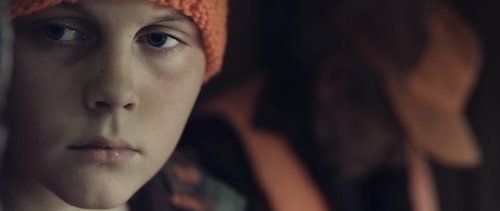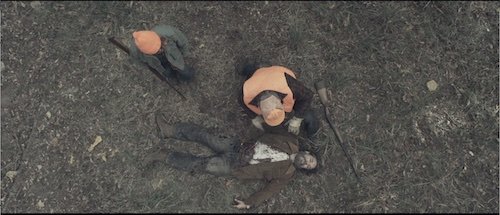10 Years of Come Morning
Images provided by Fabled Motion Pictures
Many moons ago a friend asked me if I wanted to do some film writing for an online magazine she was developing. I never expected that this pastime would become a passion. Since then I have continued to explore my journalistic adventures with this site, but I will never forget the people who I had the pleasure to meet and interview that have shaped my voice as a writer.
One of the very first directors I met and chatted with was Derrick Sims for his feature debut Come Morning. Come Morning is a thriller set in the early 1970s Arkansas that focuses on a hunting accident that changes the lives of Frank and his grandson. This film is vulnerable and robust, a towering feat for a first-time filmmaker. I gravitated towards the depth of the story but was even further intrigued by the creativity of Sims. Years later, and worlds apart, our relationship has unfolded into a friendship of creative respect.
It’s crazy to think that 10 years have passed in a blink of an eye, but also at how our individual careers unfolded. I have pursued a professional career in braille and Sims explored academics and was a film lecture in New Zealand. But our love of film hasn’t changed, and that led to our latest interaction with each other.
This past October was the 10-year anniversary of Come Morning’s premiere at the 19th annual Austin Film Festival, and for this momentous occasion, Sims had a screening of the film at The Regent Cinema in Pahiatua, NZ. I would have given anything to tap back into that person's journalist—director relationship, but I was happy to send along questions to touch base and to look back at the evolution of the film. Sims were gracious enough to answer these questions through messenger, and once again, we had a wonderful conversation over his extraordinary film Come Morning.
Images provided by Fabled Motion Pictures
TES: Have you kept up with the cast/crew? Have you been able to work with any of them again?
DS: Not as many and as much as I’d like, honestly. The ones that are active on social media, I’ve kept up with them the most. Maurice Mejia, who played “Jack” in the film, is still a very close friend who we talk to ever so often. Kinda strange being on the other side of the planet now. It’s increasingly harder for Alaina [Sims] and I to keep up with anyone back “home” these days. I haven’t seen Thor who played “D” in a very long time. He’s 21 yrs old now! Kinda wild how I still FEEL so close to them, because this movie just keeps going. I see them all the time. They’re on posters on the walls of my office and studio. The film seems to play every year in a cinema somewhere, so it’s like they’re all still with me - sorta frozen in that time.
TES: Is there anything you wish you would have done differently, anytime during production?
DS: Oh, of course. The cast was perfect. I wouldn’t change them at all. And the crew was very small but perfectly adequate. But the biggest issue was time. 12 days are so short of a schedule for ANY film, much less one that has about 20 locations and kids, animals, long night shoots, etc. If we could have doubled our shoot schedule, I think we’d have a film that I was even happier with. There are entire scenes we never got to shoot, many that we had to rush and in turn didn’t get the coverage needed to put them together in post properly. On the DVD and Blu-ray release, I think there are something like 10 deleted scenes...and those were the ones we shot. A whole sequence of D being scared out of his mind, being chased by coyotes (or what he thinks are coyotes), falling into a bog, and crawling out only to die alone on the bank was never shot. We did get the boy falling into the bog, but it wasn’t enough. It still makes me sad knowing all that was never realized due entirely to lack of time.
Images provided by Fabled Motion Pictures
TES: What have become your biggest lessons learned, or greatest takeaways, from this experience?
DS: Time is the most important thing to have when you’re making a film. Talent and resources are great, but if you have lots of time, that can help make up for it.
TES: 10 years on, can you actually enjoy the film, or are you still thinking about how to make it “better"?
DS: Oh, I’ve enjoyed the film from the time it premiered! It may sound a bit strange, especially since most filmmakers claim to hate their films and not be able to watch them, but I love Come Morning. And I love it even more now than I ever have. Watching it on its 10th anniversary with a big, enthusiastic crowd was just tremendous. For everything, it lacks (and it lacks a lot) it makes up for in heart. Also, so many of the people it’s based on and were around set when we shot - they’re dead now. And many of the locations were destroyed by a tornado the year after production, so it’s a sort of time capsule for those people and places. I find that comforting. And no, I don’t beat myself up about all the ways it could be better. I feel me and my team gave more than 100% of what we could at the time. We left it all “on the table.” And that’s evident in the film, I reckon - even more so now than ever.
TES: Do you see elements of Come Morning and that experience in your other projects?
DS: Oh yeah! In fact, right after Come Morning, my career as a DP became “Hey, can you do for us what you did for Come Morning?” What productions were looking for were really low-budget approaches to dark, especially nighttime, cinematography. Before, I’d never shot a horror film, but after Come Morning, it seemed that’s what people wanted me for - even though my film doesn’t really fit into the horror genre. So visually, yeah, I think elements of Come Morning are all over my visual style. I directed another feature in 2016, and I think in that project, the pacing of Come Morning manifests itself. Audiences found it a bit more frustrating in my second picture, but oh well.
Both films I made for myself. They were reflections of my own history and a sort of cathartic way of getting those things out in narrative form, especially The Perfect Host: A Southern Gothic Tale. Unlike many filmmakers, I just had producers (and low budgets) that didn’t really dictate what I was doing. They trusted me to make something worthwhile and left me to it. That’s something you hardly ever get as a filmmaker. I’m very lucky and don’t expect to ever get it again - sadly.
TES: Do you think this is a story you can see yourself telling now, or is it specific to who you were then?
DS: Absolutely! I would remake the film from the exact same script in heartbeat. Honestly! I’ve thought about that many times in the past. It’s not unprecedented that a filmmaker remake their own work. Hitchcock did it. DeMille did it. Haneke did it. I’m not comparing myself to those directors, and while I realize their remakes may not be as good as the originals, but I’d definitely give it a go. Just having a completed version of the story would feel great.
As for me and how I’ve changed since production on Come Morning, I HAVE changed. But the basis for the script was much more about my childhood and more primal in my DNA. It’s deeply ingrained, and I’ll never escape it. Sounds foreboding, eh?!? Anyway, I’d love a chance to remake the film or at least revisit it or expand the story - Come Evening, the follow-up 20 yrs later where the same blood feud is still on and the Mitchell boys are out of prison or something like that. Actually, that sounds pretty good!
Images provided by Fabled Motion Pictures
TES: So I guess you have thought about what has happened to the characters since the end of the film?
DS: Ha! Yes! In fact, the idea of the Mitchell boys returning has popped up in my head many times in the past 10 yrs. Also, the return of D. Imagine what that whole experience did to him. It would be fascinating to go there and resurrect these characters and see what’s going on with them. Someone at...maybe Oxford Film Festival?...anyway, someone once proposed to me what they thought happened to D after the final frame of the movie - and that shit was really dark. It was way darker than I’d ever considered. They thought he’d become suicidal. I wouldn’t go there - never. But rewatching the film, you could see how that could be the case. No, in my mind, they all go on living. Something else that intrigues me is what happened before the events of Come Morning. The feud that is the catalyst for the whole thing, that could be worth revisiting. The characters involved in that fight are introduced in Come Morning. You get a bit of the story, but a living Marion Mitchell and a living father, (played by Dean Denton in the film) would be cool to see.
TES: What is your best memory of the film over the past 10 years?
DS: Austin Film Festival will always be the tentpole of this film’s memory. In my whole career, it’s still one of the greatest, most memorable things. I loved the city, their attitude and support for Come Morning, and the energy about it. On the 10 yr anniversary, my daughter got to watch it for the first time. She’s grown up hearing about it, seeing the artwork, even playing with some of the props from the film, but it was nice sitting with her in the cinema and watching it - telling her about this where I grew up, etc. That was nice too.
Images provided by Fabled Motion Pictures
TES: Do you think you back then would have ever imagined you'd be where you are now?
DS: Never. Back then, I thought I’d still be living in LA, making 2-3 features a year as a DP. That was the dream, and I probably could have done that and been happy. Instead, I’m living in New Zealand, having a hobbit’s life and a family, and making a few projects a year. If you’d had told me that back in 2012, I’d have probably said, “Yes, please!”
TES: Now that you have moved away, has Come Morning become a love letter to the home of your youth?
DS: Yeah, that’s exactly right. Funny enough, I’ve seen it 3x in the last year in different cinemas in New Zealand, and each time it takes me back to that place, and while the film is dark and even a bit depressing in its narrative, it really comforts me. I didn’t have the foresight back then to know how much that story/place/time would mean down the road, but it’s meant the world. Come Morning ended up being a professional calling card. It was a trial by fire. It was a stamp in time. It was a dream come true. I love it, and I love what it’s become in the years since.
I find myself reinvigorated when I talk film shop talk with Sims. I think that’s one of the ties that bind us, we love film and the way the creative exploration of art can affect a viewer on many different levels (that and our shared love of Carl Theodor Dreyer films). It’s not easy making a film, and for every stressful last-minute change that needs to happen, you also have beautiful spontaneous moments that you’ll never be able to replicate. The experience is unique, but if you love the art, the production is one you will never forget. And as you can see from the above interview with Sims, 10 years and beyond will never extinguish the passion he has for his experiences in making films.
If you haven’t seen the film, I highly recommend it. Come Morning is available on multiple streaming platforms (AppleTV, Amazon Prime, TubiTV, Roku Channel), and is available on DVD and Blu-ray. Derrick Sims is also a filmmaker you should keep an eye on (Fabled Motion Pictures website). After several years of being a film lecturer in New Zealand, he has the opportunity again to focus solely on his filmmaking ventures. He may have a serene life in New Zealand, but that’s just the perfect breeding ground for amazing films, and I for one can’t wait to see what he directs next.
Cheers to 10 years of Come Morning, and many more of director-writer Derrick Sims.
Written by Lisa M Mejia
Images provided by Fabled Motion Pictures







